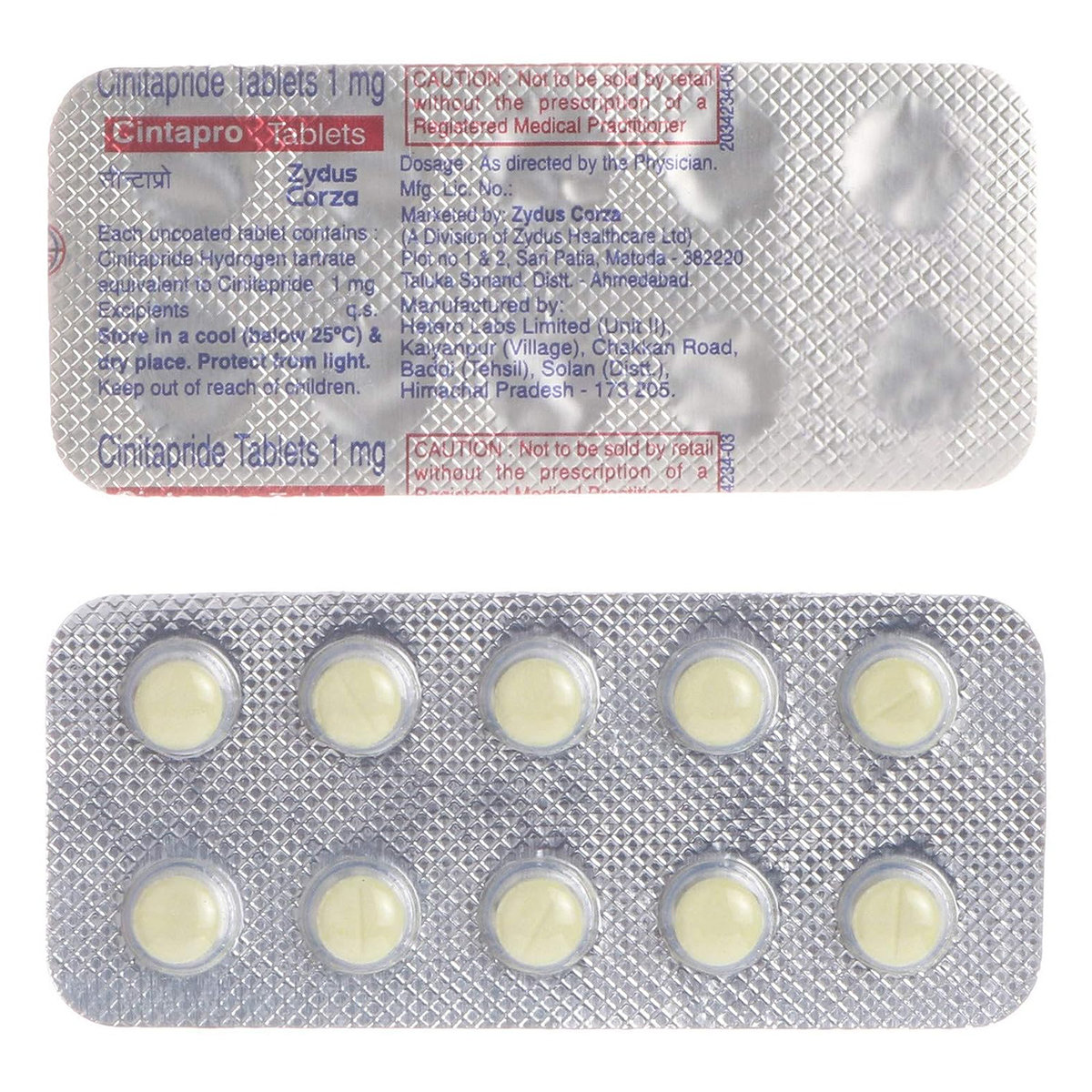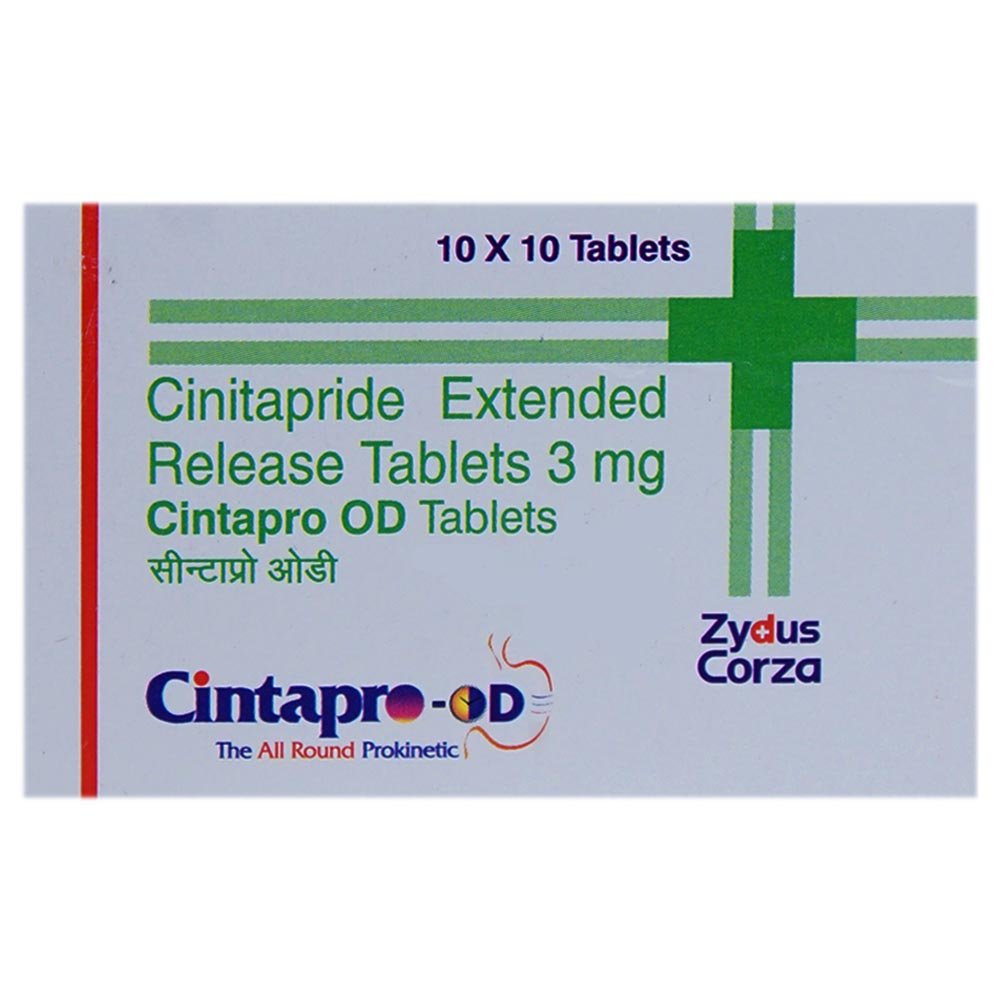Cinitapride
About Cinitapride
Cinitapride belongs to a group of medicines called 'gastrointestinal prokinetic agent' used to treat gastro-oesophageal reflux disease (reflux of gastric contents into the oesophagus), and symptoms of indigestion (slow gastric emptying). Gastroesophageal reflux disease (GERD) occurs when stomach acid frequently flows back into the food pipe (oesophagus). Indigestion is the feeling of stomach fullness (bloating) due to excess acid and gas formation.
Cinitapride contains 'Cinitapride' that increases the pressure of the inferior oesophageal sphincter, thereby preventing the back-flow of food and acid from the stomach into the mouth. This helps treat gastro-oesophageal acid reflux. Cinitapride increases gastrointestinal motility by enhancing the strength of contractions without disrupting their rhythm, thereby helps treat indigestion and improves gastrointestinal function.
You are advised to take Cinitapride for as long as your doctor has prescribed it for you depending on your medical condition. In some cases, you may experience certain common side-effects such as headache, nausea, drowsiness and diarrhoea. Most of these side-effects do not require medical attention and will resolve gradually over time. However, you are advised to talk to your doctor if you experience these side-effects persistently.
Inform your doctor before taking Cinitapride if you have a history of gastrointestinal bleeding, mechanical perforation/obstruction, or movement disorder. Consult your doctor if you are pregnant or breastfeeding. Cinitapride may cause drowsiness, so drive only if you are alert. Cinitapride should not be given to children as safety has not been established. Avoid consuming alcohol along with Cinitapride as it could lead to increased drowsiness and can elevate the production of stomach acid.
Uses of Cinitapride
Medicinal Benefits
Cinitapride belongs to a group of medicines called gastroprokinetic agents used to treat gastro-oesophageal reflux disease (reflux of gastric contents into the food pipe), and indigestion (slow gastric emptying). Cinitapride increases the pressure of the inferior oesophageal sphincter, thereby preventing the back-flow of food and acid from the stomach into the mouth. This helps in treating gastro-oesophageal acid reflux. Cinitapride increases gastrointestinal motility by enhancing the strength of contractions without disrupting their rhythm, thereby helps in treating indigestion.
Directions for Use
Storage
Side Effects of Cinitapride
- Headache
- Nausea
- Drowsiness
- Diarrhoea
Drug Warnings
Do not take Cinitapride if you are allergic to any of its contents. Inform your doctor before taking Cinitapride if you have a history of gastrointestinal bleeding, mechanical perforation/obstruction, or movement disorder. Consult your doctor if you are pregnant or breastfeeding. Cinitapride may cause drowsiness, so drive only if you are alert. Cinitapride should not be given to children as safety has not been established. Avoid consuming alcohol along with Cinitapride as it could lead to increased drowsiness and can elevate the production of stomach acid. Keep your doctor informed about your health condition and medicines to rule out any side-effects.
Drug Interactions
Drug-Drug Interactions: Cinitapride may interact with a drug used to treat motion sickness (phenothiazine), cardiac glycoside (digoxin), anti-dopaminergic drugs (used to treat schizophrenia), anticholinergic drugs (used to treat overactive bladder and COPD) and opioid analgesics (used to relieve pain).
Drug-Food Interactions: No interactions found/established.
Drug-Disease Interactions: Inform your doctor if you have gastrointestinal bleeding, mechanical perforation/obstruction, or movement disorder.
Drug-Drug Interactions Checker List:
Safety Advice

Alcohol
unsafeAvoid consumption of alcohol while taking Cinitapride. Alcohol intake leads to increased production of stomach acid, thereby increasing acidity and heartburn.

Pregnancy
cautionPlease consult your doctor if you have any concerns regarding this; your doctor will prescribe only if the benefits outweigh the risks.

Breast Feeding
cautionConsult your doctor before taking Cinitapride; your doctor will decide whether Cinitapride can be taken by breastfeeding mothers or not.

Driving
cautionCinitapride may cause drowsiness. Do not drive or operate machinery unless you are alert.

Liver
cautionConsult your doctor before taking Cinitapride if you have a liver impairment or any concerns regarding this.

Kidney
cautionConsult your doctor before taking Cinitapride if you have kidney impairment or any concerns regarding this.

Children
unsafeCinitapride should not be given to children as safety and effectiveness were not established.
Habit Forming
Diet & Lifestyle Advise
- Eat smaller meals more often.
- Avoid smoking and alcohol consumption. Alcohol intake leads to increased production of stomach acid, thereby increasing acidity and heartburn.
- Maintain a healthy weight by regular exercising.
- Avoid lying down after eating.
- Avoid tight-fitting clothes.
- Maintain a healthy weight by regular exercising.
- Practise relaxation techniques and avoid stress by doing yoga or meditation.
- Avoid foods such as high-fat food, spicy food, chocolates, citrus fruits, pineapple, tomato, onion, garlic, tea and soda.
- Avoid sitting continuously as it may trigger acidity. Take a break of 5 minutes every hour by doing brisk walking or stretching.
Patients Concern
Disease/Condition Glossary
GERD (Gastroesophageal reflux disease): Gastroesophageal reflux disease (GERD) occurs when stomach acid frequently flows back into the food pipe (oesophagus). This backflow (acid reflux) irritates the food pipe and causes heartburn. Symptoms include heartburn, sour or bitter taste in the mouth, and difficulty swallowing.
Indigestion: It is the feeling of fullness that occurs due to slow gastric emptying (emptying of food from the stomach into the intestine). Symptoms include stomach pain, bloating, heartburn, nausea and vomiting.
FAQs
Cinitapride works by increasing the movement of the muscles of the oesophagus (food pipe), stomach, and intestines during digestion. Cinitapride acts upon a chemical messenger called ‘serotonin’ located in the nerves of the digestive tract, thereby increasing the release of acetylcholine. As a result, stomach and intestines motility speed up, thereby improving gastrointestinal function.
Patients with a history of gastrointestinal bleeding/ulcer, movement disorders, mechanical obstruction or perforations (holes) in the intestine should contact a doctor before using Cinitapride.
Diarrhoea might be a side-effect of Cinitapride. Drink lots of fluids/water and eat non-spicy food if you experience diarrhoea. Besides this, probiotics and prebiotic intake can help cope with water loss. If you find blood in stools (tarry stools) or if you experience severe diarrhoea, consult your doctor. Do not take anti-diarrheal medicine on your own.
Avoid lying down immediately after meals. Raise the head of the bed 10-20 cm by putting a pillow so that the head and chest are above the waist. Besides this, avoid smoking, alcohol drinking, and eating spicy oily foods. This will helps to prevent acid reflux and heartburn.






